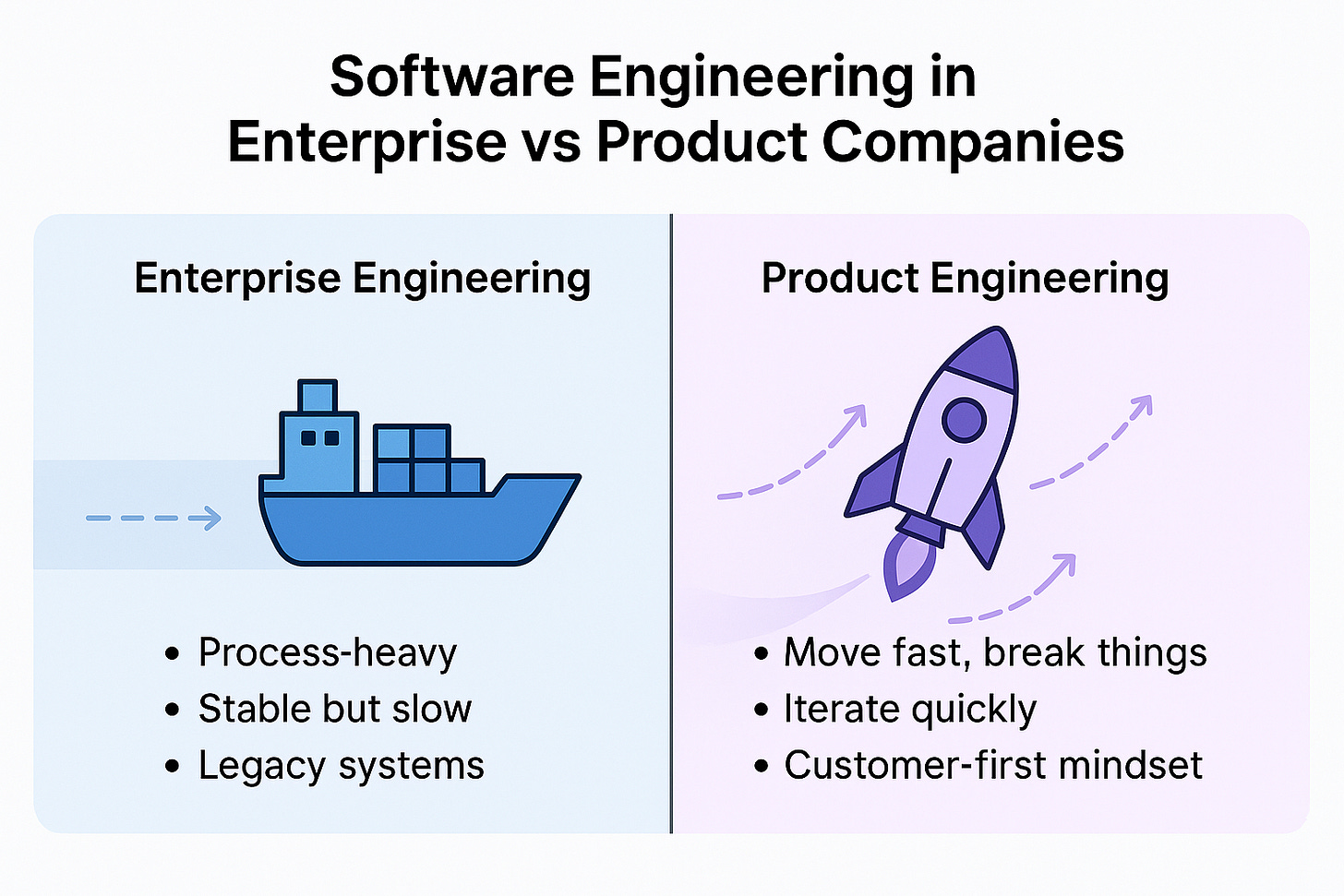Software Engineering in Enterprise vs Product Companies
Difference in software engineering culture and how they operate
8 years, 4 companies, 2 very different worlds
Over the last 8 years, I’ve worked across both enterprise and product companies.
From Salesforce and SAP to Meta and Tesla, I’ve seen how the same job title, “Software Engineer,” can mean completely different things depending on where you are.
Breaking down my learnings in the newsletter
Working in Enterprise Companies (Salesforce, SAP)
When I joined Salesforce, I thought I’d be pushing code every week.
Instead, my first change - a tiny UI fix took two weeks to go live.
Why?
Because every step had a process:
Design reviews
Multiple code reviews
QA testing
And deployment only on approved days
At first, it was frustrating.
But later I understood: that’s how you keep software stable when it powers thousands of businesses.
1. Process is everything
Enterprise companies are built around reliability
Their systems run for years, not months
At SAP, I once touched a module written in 2007, and it was still running in production
You learn why things move slowly:
Because breaking one service could impact hundreds of customers.
So, you learn to think carefully before you code.
You write tests. You follow checklists. You become patient
2. Customers decide what you build
Enterprise work is customer-driven, not user-driven
I once worked three months on a feature just because one big client needed it for renewal
No fancy A/B tests or dashboards
Just: build it, make sure it works, and never break it again.
It’s less about “growth” and more about trust
You’re not chasing clicks, you’re keeping billion-dollar businesses running smoothly.
What it teaches you
How to design stable and resilient systems
How to work with legacy code
How to be structured and reliable as an engineer
But there’s a tradeoff
You don’t always see the impact of what you build
Innovation can feel slow
Working in Product Companies (Meta, Tesla)
Then came Meta, a completely different universe.
On day two, my manager said, “You should have something shipped by next week.”
I thought he was joking. He wasn’t.
1. You own everything
At Meta, engineers own their projects end-to-end.
You design it, build it, test it, launch it, and fix it if it breaks.
It’s fast-paced. You feel pressure, but also freedom.
When I launched my first feature, I was watching metrics every 10 minutes, refreshing dashboards every minute
It was scary and thrilling.
That feeling of seeing your work used by millions - it’s addictive.
2. Everything is data-driven
At Meta, decisions were made from numbers, not opinions.
Every meeting started with:
“What does the data say?”
If something didn’t move engagement, impact, or efficiency, it was dropped immediately.
You learn to stop guessing and start measuring
It pushes you to think like a product owner, not just a coder
3. Tech moves fast
Product companies love trying new tools
One quarter we were using React; next quarter, a new internal framework.
It keeps you sharp, but also on your toes.
You have to keep learning constantly.
What it teaches you
How to move fast and experiment
How to measure impact
How to take ownership
The tradeoff?
Things can get chaotic. Priorities change overnight
And you sometimes feel like you’re sprinting all the time
What I Learned from Both
If I had to sum it up:
Enterprise companies teach you how to build things that last.
Product companies teach you how to build things that matter right now.
Enterprise sharpens your discipline
Product sharpens your impact mindset
And if you can learn both, you become a much stronger engineer.
Because one day you’ll need to:
Ship fast and keep things stable.
Move with speed and design for scale.
That’s the balance every great engineer eventually learns
Final Thoughts
In the enterprise, I learned patience, structure, and long-term thinking
In product companies, I learned speed, ownership, and decision-making
Both are valuable. Both make you grow
And both are needed in tech
If you’re early in your career, join a place where you’ll learn the most, not where you’ll be most comfortable
If you’re mid-career, go where you’ll influence the most
And if you ever get the chance, try both worlds.
You’ll come out not just a better engineer, but a more adaptable one
This newsletter is funded by the support of readers like yourself
If you’re not already a paid subscriber, consider upgrading to get maximum benefits and put your career growth on steroids
Here’s how I can help:
Join my cohort
“Break Into Senior Engineering Roles,” a live cohort course to help you prepare better and position yourself right for tech interviews and senior engineering roles. [Check Details Here]Sponsor this newsletter
Want to reach 23,000+ senior engineers and tech leaders? [See sponsorship options]
Stay in touch
Find me on LinkedIn, X, Instagram, Threads, or Bluesky.
Any questions? Just email me at hemant.pandey17@gmail.com




I have worked in enterprise companies for more than 10 years.
I am a department manager now.
My concern is that employees have no motivation.